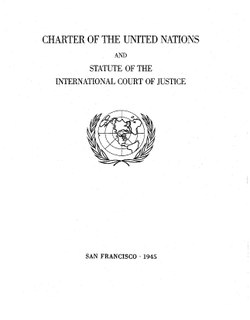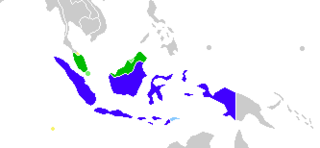
The Charter of the United Nations of 1945 is the foundational treaty of the United Nations, an intergovernmental organization. The UN Charter articulated a commitment to uphold human rights of citizens and outlined a broad set of principles relating to achieving ‘higher standards of living’, addressing ‘economic, social, health, and related problems,’ and ‘universal respect for, and observance of, human rights and fundamental freedoms for all without distinction as to race, sex, language, or religion.’ As a charter, it is a constituent treaty, and all members are bound by its articles. Furthermore, Article 103 of the Charter states that obligations to the United Nations prevail over all other treaty obligations.
The Constitution of South Africa is the supreme law of the Republic of South Africa. It provides the legal foundation for the existence of the republic,it sets out the rights and duties of its citizens, and defines the structure of the government. The current constitution, the country's fifth, was drawn up by the Parliament elected in 1994 in the South African general election, 1994. It was promulgated by President Nelson Mandela on 18 December 1996 and came into effect on 4 February 1997, replacing the Interim Constitution of 1993.

The Federal Constitution of Malaysia, which came into force in 1957, is the supreme law of Malaysia. The Federation was initially called the Federation of Malaya and it adopted its present name, Malaysia, when the States of Sabah, Sarawak and Singapore became part of the Federation. The Constitution establishes the Federation as a constitutional monarchy having the Yang di-Pertuan Agong as the Head of State whose roles are largely ceremonial. It provides for the establishment and the organisation of three main branches of the government: the bicameral legislative branch called the Parliament, which consists of the House of Representatives and the Senate ; the executive branch led by the Prime Minister and his Cabinet Ministers; and the judicial branch headed by the Federal Court.
The Internal Security Act 1960 was a preventive detention law in force in Malaysia. The legislation was enacted after Malaysia gained independence from Britain in 1957. The ISA allows for detention without trial or criminal charges under limited, legally defined circumstances. On 15 September 2011, the Prime Minister of Malaysia, Najib Razak said that this legislation will be repealed and replaced by two new laws. The ISA was replaced and repealed by the Security Offences Act 2012 which has been passed by Parliament and given the royal assent on 18 June 2012. The Act came into force on 31 July 2012.

In the United Kingdom reserved matters and excepted matters are the areas of government policy where the UK Parliament had kept the exclusive power (jurisdiction) to make laws (legislate) in Scotland, Wales and Northern Ireland.

The Health and Safety at Work etc. Act 1974 is an Act of the Parliament of the United Kingdom that as of 2011 defines the fundamental structure and authority for the encouragement, regulation and enforcement of workplace health, safety and welfare within the United Kingdom.

The Insolvency Act 1986 is an Act of the Parliament of the United Kingdom that provides the legal platform for all matters relating to personal and corporate insolvency in the UK.

The Malaysian Communications and Multimedia Commission is a regulatory body and its key role is the regulation of the communications and multimedia industry based on the powers provided for in the Malaysian Communications and Multimedia Commission Act 1998, the Communications and Multimedia Act 1998, and the Strategic Trade Act 2010. Pursuant to these Acts, its role is also to implement and promote the Government's national policy objectives for the communications and multimedia sector. MCMC is also charged with overseeing the new regulatory framework for the converging telecommunications and broadcasting industries and online activities. In 2001, MCMC's role was expanded to include overseeing the postal service sector pursuant to the Postal Services Act 1991 and licensing of the Certification Authorities under the Digital Signature Act 1997.

The Fisheries Act 1985 is a Malaysian federal act relating to the administration and management of fisheries, including the conservation and development of maritime and estuarine fishing and fisheries in Malaysia waters, protection to aquatic mammals and turtles and riverine fishing in Malaysia and to matters connected to establishment of marine parks and marine reserves.

Canada (AG) v Ontario (AG), also known as In re the Regulation and Control of Aeronautics in Canada and the Aeronautics Reference, is a decision of the Judicial Committee of the Privy Council on the interpretation of the Canadian Constitution. Lord Sankey decided in the case that the federal government has the authority to govern the subject of aeronautics, including licensing of pilots, aircraft, and commercial services and regulations for navigation and safety.
The Energy Commission, abbreviated ST, was created under the Energy Commission Act 2001 as a new regulator for the energy industry in Peninsular Malaysia and Sabah. The Commission was established to ensure that the energy industry is developed in an efficient manner so that Malaysia is ready to meet the new challenges of globalisation and liberalisation, particularly in the energy supply industry.

The Tanzania Communications Regulatory Authority (TCRA), established by the TCRA Act No. 12 of 2003, is an independent Authority for the postal, broadcasting and electronic communications industries in the United Republic of Tanzania. It merged the former Tanzania Communications Commission and the Tanzania Broadcasting Commission. The TCRA is accountable to the Communications and Technology Ministry. The Information Communication and Technology (ICT) sector reform in Tanzania is notable in that development was influenced by regional, political (national) and technological factors. Tanzania is one of the few African countries to liberalise the communications sector whereby the Converged Licensing Framework (CLF) is used as a key strategy, in terms of the Tanzania Communications Regulations. Since inception in 2003, the TCRA has issued a number of regulations to administer the sector, but still faces a number of challenges such as the roll-out of services to under-serviced rural areas.
The Transport Act 1983 is a prime statute regulating transport activities in the State of Victoria, Australia. Key areas regulated by the statute currently include taxi and hire car services and compliance and enforcement, particularly in areas like safety and public transport ticketing and conduct.

The Constitution of Barbados is the supreme law under which Barbados is governed. The Constitution provides a legal establishment of the structure and various roles of administration of the Queen of Barbados, the Government of Barbados, as well as legal rights and responsibilities of the public and various other government officers. The Constitution which came into force in 1966 was amended in 1974, 1978, 1990, 1992, 1995, 2002 and 2003. The 1966 document succeeds several other documents concerning administration of Barbados. One of them, the Barbados Charter, is discussed in the present Constitution's Preamble. Prior statutes were created for the administration of Barbados as a colony. As a former English and later British colony, the Constitution is similar to those of other Commonwealth realms, yet distinctly different in the spirit of the Statute of Westminster. In recent years there has been some dialogue on whether Barbados should undertake a process of patriating the constitution to cease the foundation being a 1966 Act of the British House of Commons.

The Treaties of the European Union are a set of international treaties between the European Union (EU) member states which sets out the EU's constitutional basis. They establish the various EU institutions together with their remit, procedures and objectives. The EU can only act within the competences granted to it through these treaties and amendment to the treaties requires the agreement and ratification of every single signatory.

The Communications and Multimedia Act 1998, is a Malaysian law which enacted to provide for and to regulate the converging communications and multimedia industries, and for incidental matters.

The Hire-Purchase Act 1967, is a Malaysian law which enacted to regulate the form and contents of hire-purchase agreements, the rights and duties of parties to such agreements and to make provisions for other matters connected therewith and incidental thereto.

The Solid Waste and Public Cleansing Management Act 2007, is a Malaysian laws which enacted to provide for and regulate the management of controlled solid waste and public cleansing for the purpose of maintaining proper sanitation and for matters incidental thereto.

The Financial Services Act 2013, is a Malaysian laws which enacted to provide for the regulation and supervision of financial institutions, payment systems and other relevant entities and the oversight of the money market and foreign exchange market to promote financial stability and for related, consequential or incidental matters.

The Islamic Financial Services Act 2013, is a Malaysian laws which enacted to provide for the regulation and supervision of Islamic financial institutions, payment systems and other relevant entities and the oversight of the Islamic money market and Islamic foreign exchange market to promote financial stability and compliance with Shariah and for related, consequential or incidental matters.











